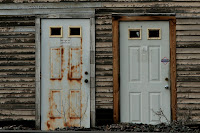Wants and Needs

The effects of our economic failings seen through the eyes of Wall Street real estate listings are obscene. Several days ago I noted that an estate built at a cost of fifty-nine million dollars and originally listed for eighty-five million dollars sold for fifty million dollars. That amount of money for a house for two boggles my mind. Why? But this is not something new. Palatial estates, over the top interiors, imported antiques--collected across the world--attest to the private wealth of the occupants.
My mother collected antique cups. It's just that her definition of antique was fluid. If the cup looked old, an imitation was acceptable, and if it was a "buy" then she bought the cup. Minor cracks were fine as long as the cracked or chipped side faced away from the viewer. Her collection never numbered more than ten because that's what space allowed. Our three-room apartment in the Bronx, short on space for four, managed to accommodate my mother's antique cups, her sewing machine, and a desk my father and I shared. One of the antique cups is on a bookcase in the loft of my home. The crack faces the wall. Turn it over and read its provenance —Made in Hong Kong.
How many people live in shelters? How many people are homeless? How many people in the world live in sub-standard housing? How many people live in mansions, estates with all the amenities? What are those amenities?
What are the amenities I need? What are those I want? My wants far exceed my needs. I tell myself they aren't excessive. Perhaps the builder of the mansion feels the same way?
It is very late Wednesday afternoon and I am seated at the coffee house I often frequent.
We don't have any mansions in this town, although we do have a few areas of low cost housing, and subsidized housing. Most homes are modest, some more expansive, but this is a town that had its roots as a mill town.
If you walk a few blocks from here, past a barber shop, three empty store fronts, two hairdressers, a flower shop, a bar, a store selling motorcycles and accessories—and then take a right and go up a long slowing rising hill you'll find the original mill houses. They were built for the mill workers. Over the years, when the mill morphed into buildings occupied by a list of myriad companies, the mill workers left and the houses were sold to private owners. People updated them, adding rooms, building up or sideways. Each house almost rubs against its neighbors.
Many of our local gardeners attend these postage sized old mill house plots. Their miniature gardens display galaxies of colors. When some of the gardeners wanted more space they chose to work on neglected spaces around town.
Wants and needs, interconnected, yet separate. Yesterday I visited a family whose son died on Saturday after a three-year battle with bone cancer. His mother often spoke about how he was living his life until the very end. He celebrated each day by engaging with life. Wants and needs. The family sought every treatment, new protocol, and possible cure. Toward the end the wants narrowed down to seeing a basketball game or another baseball game.
When I dusted the loft I picked up my mother's cup and saucer and realized that she didn't need the real antique.
Linda Watskin © 2010



